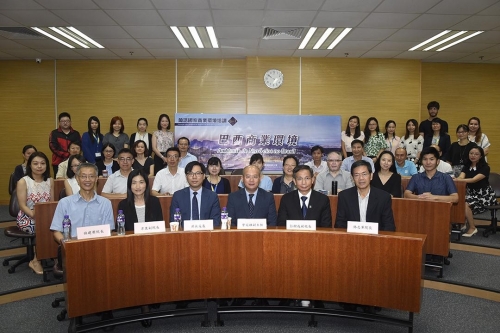
Group photo of Deputy Director Chang Kun Hong (3rd from right), Director Hung Bo (3rd from left), Vice President Pang Su Seng (2nd from right), and M.U.S.T. faculty.
In response to the Macao S.A.R. Government’s initiative of “steering Macau toward becoming a training base of Portuguese talents in the Asia-Pacific region”, in alignment with the “One Belt, One Road” movement, and in contribution to Chinese-Portuguese collaboration in teaching and research, Macau University of Science and Technology held a training course on “Business Trade in Lusophone Countries (I): Business Environment of Brazil”, which was sponsored by the Macau Tertiary Education Services Office (GAES) and opened in the morning of August 23 at M.U.S.T.. The course opens to teaching and research staff of M.U.S.T. who have demands with respect to the Portuguese language and business environment analysis; it runs for ten days and amounts in total to 60 hours.
Deputy Director Chang Kun Hong of the GAES, Director Hung Bo of the Department of Culture, the Liaison Office of the Central Government of People’s Republic of China in the Macao S.A.R., Vice President Pang Su Seng of M.U.S.T., Dean Lin Zhi Jun of School of Business, Dean Sun Jian Rong of the University International College, Executive Vice Dean Fang Quan of the Faculty of Law, Assistant Director Song Ya Nan of the Institute for Social and Cultural Research, and others attended the opening ceremony of the Course.
The curriculum of the Course is comprised of two sections: business Portuguese and business environment of Brazil; by way of studying basic Portuguese and application of business Portuguese, along with the macroeconomic environment, law environment, business and trade, finance, and labor market environment of Brazil, the course aims to improve the university faculty’s knowledge of the Lusophone countries and their business environments, improve the faculty’s ability in using the Portuguese language in business dialogues, enhance teaching of business Portuguese, and elevate the university faculty’s research capacity in studying the role of platform of Macau and Sino-Portuguese relationship.
Deputy Director Chang Kun Hong of the GAEs noted that Macau is a place where Chinese culture meets Portuguese culture, and therefore it plays the role of a bridge in Chinese-Portuguese cultural exchanges. The S.A.R. government has been making continuous efforts in moving forward the development of “One Center, One Platform”, the success of which demands the support of a large number of bilingual talents of Chinese and Portuguese. The Macau S.A.R. government has also been making ready better conditions in training bilingual Chinese-Portuguese talents in the hope of enabling Macau to become a training base for bilingual Chinese-Portuguese talents; to achieve such a goal, however, requires the higher institutions to exert a very important role. Thus, the GAES made available a special grant for Macau’s higher institutions to provide the university teachers with more opportunities to understand the environment of the lusophone countries and improve their Portuguese proficiencies; the GAES hopes that M.U.S.T. continues to offer more training courses concerning the lusophone countries and more support by virtue of supplying more human resources so as to enable Macau to play a better role as the “China-Lusophone Countries Trade Services Platform” and become a more important part in the “One Belt, One Road” movement, and ultimately provide support in building Macau into a training base for Portuguese talents in the Asia-Pacific region.
Vice President Pang Su Seng of M.U.S.T. said that the trade relationship of China and the lusophone countries has experienced fast development, making China and the lusophone countries currently in need of not only a large number of translators but also a large number of professionals who not only know the Portuguese language and the Chinese language but also understand the countries’ engineering, business and trade, and laws; plus that Macau can not go without the support of language if it hopes to accomplish its goal of becoming the “China and Lusophone Countries Trade Services Platform”. The Portuguese language program of the University International College of M.U.S.T. already starts to supply Macau with Portuguese professionals. Meanwhile, with respect to research, studies concerning Sino-Lusophone relationships and Macau’s platform role have always been long-time key research projects of the Institute for Social and Cultural Research of M.U.S.T., which covers a wide range of categories, including exchanges and cooperation of China and the lusophone countries in politics, economy, law, education and culture. This on-going training course integrates the faculty strengths and the existing research achievements of M.U.S.T., and it is hoped that the University continues to exert an important role in Macau’s research and teaching in relation to the lusophone countries and make a greater contribution to Macau by virtue of supplying more language professionals and technological professionals that are proficient in Portuguese.





